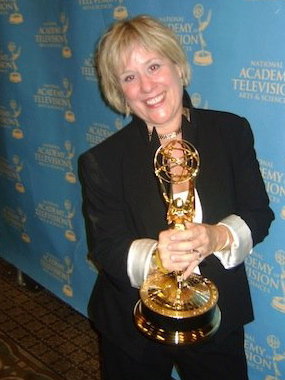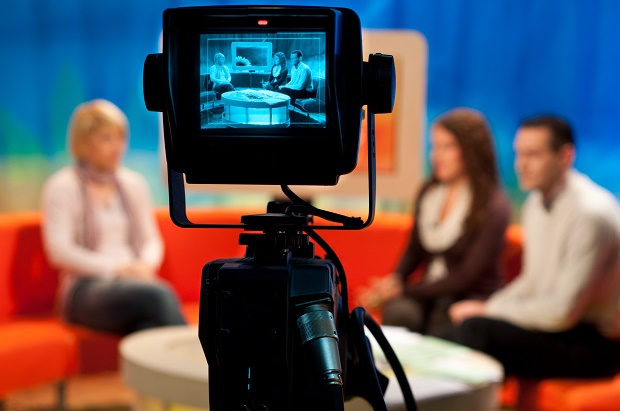How to get media exposure that helps sell books
When Los Angeles-based media coach Gina Rubinstein offered to write a guest blog post for me that would help authors sell books, I was happy to accept. Rubinstein trains her clients to use the media to grow their businesses. She is an Emmy Award-winning executive producer of reality television who has transferred her decades of directing “real people” into helping authors, speakers, and others become engaging and confident on-camera. She offers a free evaluation to anyone who fills out a short questionnaire.
How to get media exposure that helps sell books
By Gina Rubinstein
You’ve written a book. Congratulations!
But now what?
How do you get your book to its audience?
The media, both traditional and social, is the best tool you have. You can play with the big boys and get national exposure. But first you have to prepare for your place in the spotlight.
Here are 10 tips on how to prepare to use the media to sell books and grow your audience and business.
1. Go from author to expert.
Become an expert in your field, if you’re not already. Being an author gives you credibility as well, so build on that. Experts are widely used on TV and radio to give background and perspective on current events. Fill in the gaps in your knowledge so you can become a “go to” person in your field.
2. Tie in your expertise to the hot topics of the day.
This is critical for getting booked on TV and radio. What knowledge and experience can you add to the discussion of a hot topic? Be creative. We booked one of my clients, who had written a book on parenting, on a show about legalizing marijuana because she had advice for parents who want to say “yes” to pot for themselves and “no” to pot for their kids. What interesting angle can you bring to the topics on everyone’s minds?
3. Have a good elevator pitch.
In three or four sentences I need to know who you are, why I should listen to you, what problem you’re going to solve, how it affects me, and what fresh ideas you have as solutions. A client of mine literally found herself in an elevator with a radio producer, gave her pitch, and by the time the elevator got to her floor she was booked on the producer’s show.
4. Prepare to go on-camera.
You need to be authentic, articulate and high energy to look confident and engaging on television. I do plenty of on-camera practice interviews with my clients to get them comfortable and ready for television. My client Judy Carter was so comfortable and genuine when she was on the Marie Osmond show that Marie sat in her lap after 30 seconds because she liked her so much! Watch here:
5. Have three clear-cut messages.
A message is a statement that connects a point you want to make with something your audience needs or wants. The headline of this blog is a message. It contains my point (“How to get media exposure”) with your need (“sell books”).
6. Write punchy sound bites for your message.
You need to have quotable, seemingly off-the-cuff lines that illustrate your messages. They should be about 10 to 12 seconds long. I craft them ahead of time with my clients so that they have them ready whenever they need them. Use alliteration and analogies to make them memorable.
7. Have compelling stories and statistics.
Flesh out your message with stories of people overcoming obstacles. Humanize your statistics by putting them in a context – what do those numbers mean? What picture can you paint with them?
8. Make a demo reel.
Get someone to tape you in an interview setting, and deliver your messages, stories, sound bites, and statistics. Edit together a one- to three-minute video that shows you at your best.
9. Research the national and local TV and radio shows.
Producers are hungry for guests for their shows. Check out the web sites for the national and local shows where your expertise could come into use. Don’t forget the smaller shows, especially if they reach your target audience. Get the names of television producers from the credits of the show and email them – let them know your area of expertise and include a link to your demo reel.
10. Research the bloggers who reach your target audience.
Find a blogger who’s popular with the people you want to reach, and see if you can write a guest blog post for them (that’s what I did here!). Several of my clients have seen their book sales go up after doing a guest post for someone popular in their niche.
Remember, book publicity is not only free, it’s 10 times more valuable than advertising, so follow these steps to make sure you’re prepared to take advantage of every opportunity you can generate with the press.
(Editor’s note: Take the short cut to preparing your media messages, sound bites, and pitches. Get fill-in-the-blanks templates you can use to create these and other essential media relations tools in Build Book Buzz Publicity Forms & Templates. You’ll also get actual samples of each to guide you.)
Do you have a question about how to prepare for a media interview? Ask it here in a comment so we can help!
Like what you’re reading? Get it delivered to your inbox every week by subscribing to the free Build Book Buzz newsletter. You’ll also get my free “Top 5 Free Book Promotion Resources” cheat sheet immediately!



Thank you for taking a chance on Gina and publishing her guest post. It is right on time for me as I plan my marketing of my upcoming book.
These tips are great, affordable, and easy to understand. I’ve heard of Gina’s book, and will now get it, along with revisiting the tools you’ve made available for creating buzz.
Glad the info was helpful. Stop by my website for more tips and to get a free consultation.
Wonderful read, Gina! I especially like your reminder to “go from author or expert”. As authors, I think we can easily undervalue our true contributions and expertise—not to mention our passion—for what we write and speak about. When our message becomes “second nature” to us, we sometimes quickly forget that our ideas are usually brand new to others. Thank you for the reminder!
So true, Michael. Thanks for stopping by!
Sandy
Thanks for the tips.
Thanks for posting.
You’re welcome, Scott!
Sandy